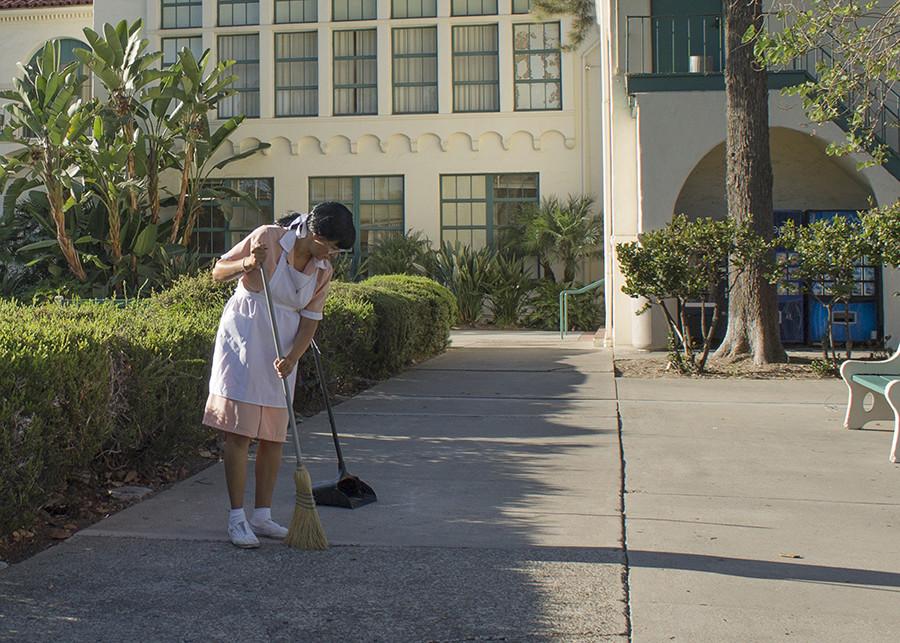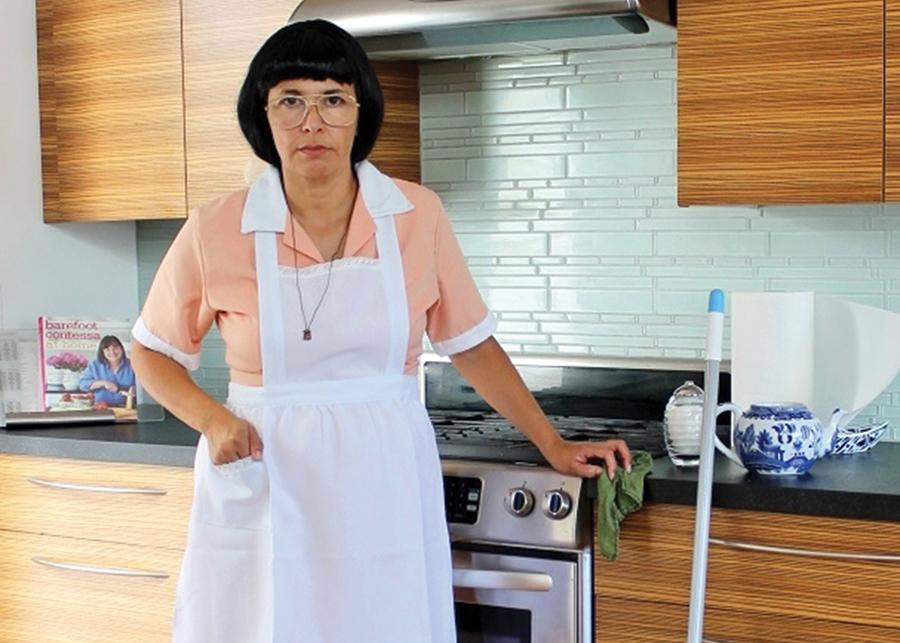As people admired the selection of paintings at the opening reception of the art exhibit “Presence” last week, a less traditional form of art may have gone unnoticed.
She made sure no dust was left unswept and that the windows sparkled; she’s a cleaning lady who immigrated from Mexico and speaks no English, and she’s the alter ego of performing artist and MFA student Claudia Cano.
Rosa was at the art opening on Nov. 5, not Cano, and she could have almost been mistaken for an actual maid. The apron that hung around her waist and covered a modest peach-colored dress was one aspect of the character Cano created.
Rosa is more than a maid. She is a social and political statement about immigrants and the way society acknowledges them — or more accurately — the way it doesn’t.
“It’s part of the performance,” Cano said. “It’s always been in the mind of confronting the audience and making them feel uncomfortable. It’s a way of creating an acknowledgement of the people who actually work and make a living cleaning.”
The character of Rosa has been hired to clean at various art venues throughout San Diego via an invoice as if she was a real person. The exhibit’s organizers, Tina Yapelli and Chantel Paul, invited Rosa to perform at the opening reception of “Presence” because of its explicit focus of the female identity and its “breadth of physical, psychological, social and political states of being.”
Yapelli curated Presence, choosing artwork related to women from the Matthew and Irish Strauss Family Foundation Collection, a private collection that often loans its artwork to galleries to promote an appreciation for contemporary art.
“My intention was was to show the diversity of expression in terms of how women are represented in the Strauss’ art collection,” Yapelli said. “(The exhibit is) an excellent opportunity to see world class art from 1850 to the present day from one of the most important private collections in the country.”
On the wall hung paintings, from an intimate scene of a freshly showered naked woman to a piece titled “Self Portrait” that depicts the Statue of Liberty in a Pakistani wedding dress and jewelry. Meanwhile Rosa hung onto her broom.
Cano is pleased to offer audiences an alternative and unique form of art at shows like this one, which primarily focuses on more traditional art such as paintings or sculptures. Cano is also the only performing artist in the entire MFA program.
“It makes you question and it’s confrontational,” she said. “What is art? Why only make art on the walls?”
Cano often interacts with the audience in all of her improvised performances, but she said the relationship between Rosa and the audience is a two-way street. They can give Rosa orders and she will do them, but Cano understands that many people may not acknowledge her at all. Despite some people’s reluctancy or hesitance to speak directly to Rosa, her goal is to raise awareness about the work available for immigrants.
“You know, the taxi driver that came from Kenya? He was a doctor or architect and now he drives a taxi,” Cano said. “These are the elements of immigration and a lot of people are misplaced politically and economically.”
Although Cano has no plans to perform at Presence again, she encourages everyone to go see the exhibit, which will be on view for free through Jan. 25 of next year. She stressed the overall value of visiting museums and surrounding oneself with art, but believes that this particular exhibit is one of the most important that the gallery has shown.
“The arts can change the mind of people. Next time you meet Rosa, I hope you get a chance to talk to her,” she said, perhaps metaphorically.
Rosa mopped the entire floor of the gallery at the end of her shift, with just a few people still lingering around at the end of the art opening.










